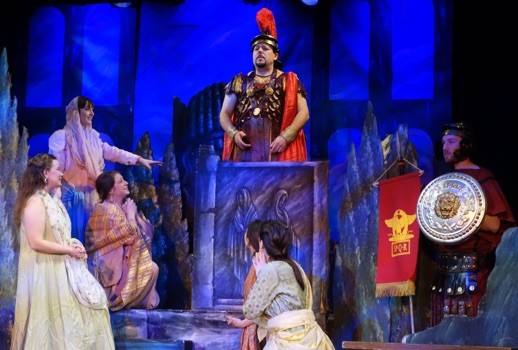

Amore Opera, a feisty and enterprising company now in its seventh year, is clearly the appropriate presenter. The company’s new digs are the charmingly old-fashioned proscenium stage of the brand new Sheen Center on Bleecker Street, a stone’s throw from the old Amato Opera House on the Bowery (also from CBGB’s, if that was your speed). Poliuto is double cast and presented with a scrappy orchestra and a sizable toga’d chorus on a very crowded stage got up to resemble an Italian Renaissance garden (poplars! statues!), though this story of Roman martyrs occurs in third-century Armenia. The sets and costumes are colorful, the staging to the point. The brass banda was appalling on the opening night, Tuesday, but much better by the second.
The score is very active, tuneful and never dull, and conductor Daniele Tirilli maintains a brisk pace. There are grand arias each time a character changes his or her mind, though repeats of the cabalettas have been cut to bring the run time to two and a half hours. There is a grand concertato in the proper style to end Act II, when the counterpoint of the several contending melodies seemed to get away from the singers or else they did not agree perfectly with the orchestra.
Husband and wife have a martial duet with which to go off to martyrdom in Act III, defying the revilements of the crowd (Donizetti had recently heard Halévy’s La Juive)—a melody that suggests the duet for Don Alvaro and Leonora in La forza del destino. (Verdi stole a lot from Donizetti, an early mentor.)
There will be two more performances, Saturday night and Sunday afternoon.
Poliuto encountered many difficulties in its early years, including a suicidal tenor and Neapolitan censors who did not want saint stories on the opera stage. Donizetti adapted the score for his first Parisian grand opera, Les Martyrs, which nowadays contends with the original for treatment. It survives in operatic memory as a beloved Callas pirate from 1960 (with Corelli and Bastianini), and was presented at Glyndebourne last summer as a vehicle for Michael Fabbiano and Ana Maria Martínez, who triumphed.
According to Wikipedia, Saint Polyeuctus, upon conversion, went on an idol-destroying rampage (he is not the patron saint of building preservation but might appeal to ISIS), despite the pleas of his wife, Paolina, and proudly went to his death in a lion-filled arena. Pierre Corneille refocused this story by giving Paolina a past with the (pagan) Roman commander, Severus, and added a slimy high priest, Callisthenes, who betrays her amours while seeking her favors himself. So we have an ethically resolved triangle, and the pagans get the best tunes because Christian rituals could not appear on the secular stage and because, face it, pagans deserve them.
Poliuto is not the center of this opera. He’s a stick. Saints on the Christian stage are like that. The interesting figures, the ones who change, make the drama: Paolina, torn between love and duty, who makes her choice by undergoing conversion, more or less before our eyes and ears, and Severo, whose jealous love for Paolina turns into something selfless when he sees her ready to give her life to her new faith. Therefore, we need a soprano and baritone who can project their inner states through the rather formal style of Donizettian melody. Such singers are rare and that, I think, explains why this opera is so seldom heard.
On both nights I attended, Paolo Buffagni sang Poliuto with a coarse but affable tenor, a grainy instrument, appealing and sizable with a good top but lacking sensuous beauty. Baritone Robert Garner sang Severo, his rival, with a fine, fluid line, some elegant ornaments and a nice projection of the awkwardness, the second-guessing that this attractive character is constantly obliged to undergo.
On Tuesday, Jessica Sandidge’s Paolina entered with a lengthy scena analyzing her plight but her voice had not warmed to the work. In Act II she revealed an exciting top expressive of her anguish as the wheels of the two plots, religious and amorous, ground her in their complications, and her long duet with Poliuto was delectable. The voice has beauty, strength and some agility, and she is a tender actress.
On Wednesday, Paolina was sung by Sara Beth Pearson, who also took a while to warm up and wore a Gypsy bangled shawl that somehow did not seem right for a pious Roman matron. She sang B’s and C’s of impressive size that landed precisely on the notes, but runs and turns spent attaining those notes were often vague of pitch.
Both sopranos seemed good candidates for Paolina’s requirements, but neither entirely fulfilled them. In general, the louder and more determined they got, the better they were—but we should see the character’s uncertainties in order to be persuaded of her serious dilemma. There should be more soft singing as well as the thrilling loud stuff.
Duncan Hartman sang the lewd Callistene with a rather dry bass on opening night; I preferred the expansive drunken-Druid character impersonated on Wednesday by Jay Gould.
The direction by company impresario Nathan Hull was simple and clear, and the acting effective, with a not-too-giggly wooden head of Jove to be knocked off its pedestal. But Mr. Hull and scenic designer Richard Cerullo should come to more of an agreement beforehand over how much stage they have to work with and how to get a sizable chorus on and off it without interrupting the flow of the drama. Less can be more.
Photo via Facebook

























Comments